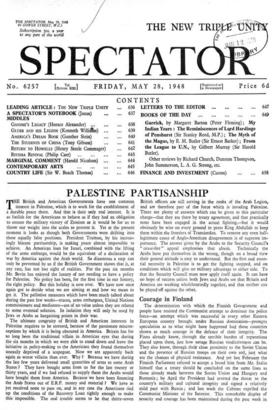PALESTINE PARTISANSHIP
THE British and American Governments have one common interest in Palestine, which is to work for the establishment of a durable peace there. And that is their only real interest. It is as foolish for the Americans to behave as if they had an obligation to ensure the military victory of Zionism as it would be for us to throw our weight into the scales to prevent it. Yet at the present moment it looks as though both Governments were drifting into these equally false positions. President Truman, by his increas- ingly blatant partisanship, is making peace almost impossible to achieve. An American loan for Israel, combined with the lifting of the arms embargo, would be the equivalent of a declaration of war by America against the Arab world. So disastrous a step can only be prevented by us if the British Government shows that it, at any rate, has not lost sight of realities. For the past six months Mr. Bevin has enjoyed the luxury of not needing to have a policy for Palestine. No policy has been, for the first time in our history, the right policy. But this holiday is now over. We have now once again got to decide what we are aiming at and how we mean to get it. The palliative measures which have been much talked about during the past few weeks—truces, arms embargoes, United Nations commissioners and mediators—are of no value unless they are related to some eventual solution. In isolation they will only be used by Jews or Arabs as bargaining points in their war.
The ultimate congruity of British and American interests in Palestine requires to be stressed, because of the passionate miscon- ceptions by which it is being obscured in America. Britain has for so long been the traditional villain in American eyes that during the six months in which we were able to stand down and leave the initiative in policy-making to the Americans they found themselves uneasily deprived of a scapegoat. Now we are apparently back again as worse villains than ever. Why ? Because we have during the last few years delivered small quantities of arms to some Arab States ? They have bought arms from us for the last twenty or thirty years, and if we had refused to supply them the Arabs would have bought them from America. Because we have been financing the Arab States out of E.R.P. money and material ? We have as yet received none to pass on, and in any case the Americans tied up the conditions of the Recovery Loan tightly enough to make this- impossible. The real trouble seems to be that thirty-seven
British officers ane still serving in the ranks of the Arab Legion, and are therefore part of the force which is invading Palestine. There are plenty of answers which can be given to this particular charge—that they are there by treaty agreement, and that practically none have been engaged in the actual fighting,—but it would obviously be wise on every ground to press King Abdullah to keep them within the frontiers of Transjordan. To remove any even half- legitimate cause of Anglo-American disagreement is of supreme im- portance. The answer given by the Arabs to the Security Council's "cease-fire" appeal emphasises that afresh. Technically the Arabs have put themselves in the wrong, though on a broad view their general attitude is easy to understand. But the first and essen-
tial necessity in Palestine is to get the fighting stopped, and on conditions which will give no military advantage to either side. To that the Security Council must now apply itself again. It can have
no hope of success unless both Jews and Arabs see that Britain and America are working wholeheartedly together, and that neither can be played off against the other.






























